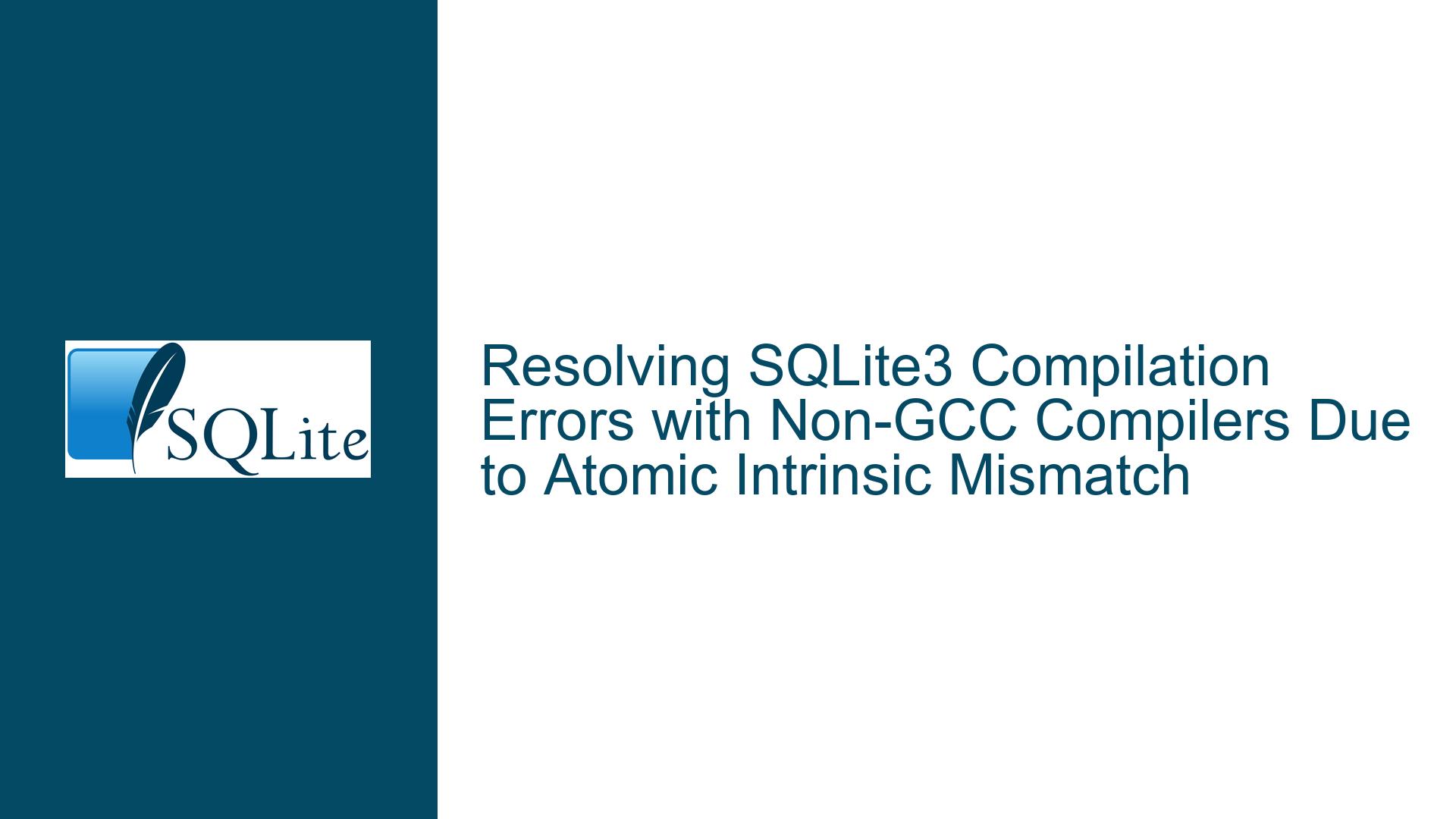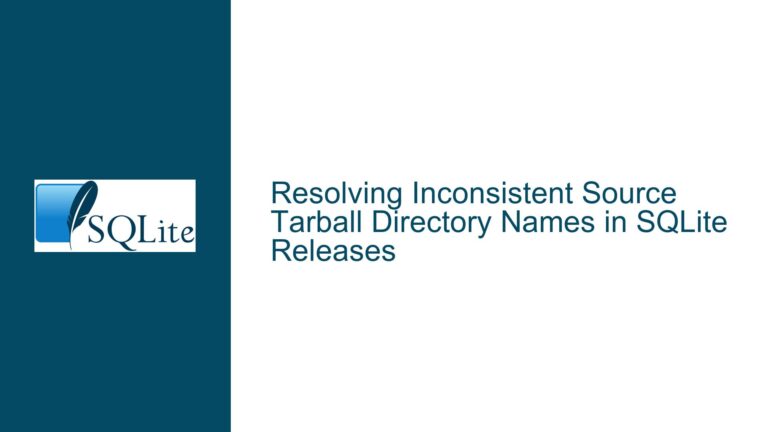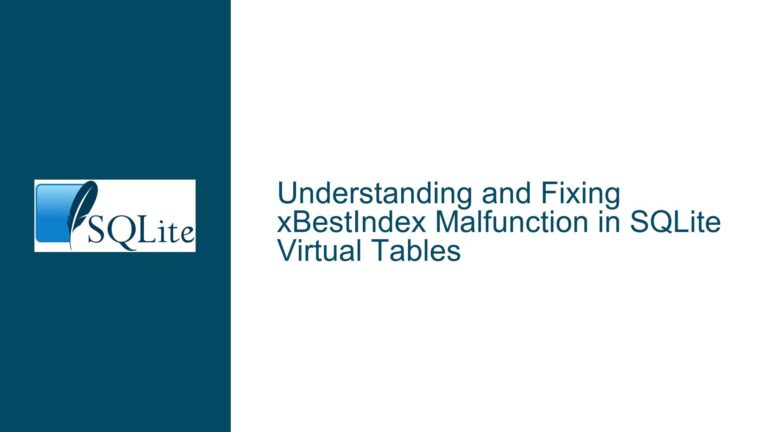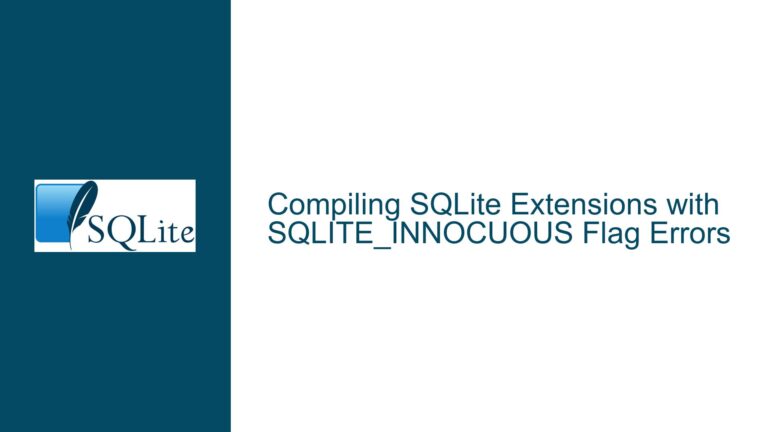Resolving SQLite3 Compilation Errors with Non-GCC Compilers Due to Atomic Intrinsic Mismatch
Atomic Intrinsic Compatibility in SQLite: GCC-Specific Functions vs. C11 Standards
Issue Overview: Mismatched Atomic Intrinsic Implementations in Non-GCC Compilers
The core issue arises from SQLite’s reliance on GCC-specific atomic intrinsic functions (__atomic_load_n and __atomic_store_n) in environments where non-GCC compilers are used. These compilers may support the C11 standard atomic operations (atomic_load and atomic_store) but lack compatibility with GCC’s extensions. The problem is rooted in SQLite’s preprocessor logic, which enables atomic intrinsics when either of two conditions is met:
- The compiler is GCC version 4.7.0 or newer.
- The compiler supports the
c_atomicextension (detected via__has_extension(c_atomic)).
However, the subsequent definitions for AtomicLoad and AtomicStore explicitly reference GCC-specific functions. This creates a conflict when using compilers like IAR, which implement the C11 standard atomics but do not provide GCC-style __atomic_* intrinsics. The result is a compilation failure, as the compiler cannot resolve the GCC-specific function names.
The mismatch occurs because the preprocessor check for c_atomic support is overly broad. While __has_extension(c_atomic) correctly identifies that the compiler supports atomic operations, it does not guarantee that the compiler uses GCC’s implementation. Compilers adhering strictly to C11/C18 standards will instead provide atomic_load and atomic_store (defined in <stdatomic.h>), which are syntactically and semantically distinct from GCC’s variants.
This issue is particularly impactful in embedded systems development, where non-GCC toolchains like IAR are prevalent due to their optimization for resource-constrained environments. The SQLite amalgamation’s design aims for portability, but this specific dependency on GCC atomic intrinsics undermines compatibility with non-GCC compilers that otherwise meet the C11 atomic requirements.
Possible Causes: Conditional Compilation Logic and Compiler-Specific Assumptions
Overly Permissive Preprocessor Checks
The SQLite source code uses#if GCC_VERSION>=4007000 || __has_extension(c_atomic)to enable atomic intrinsics. While this correctly detects compilers with GCC-compatible versions or C11 atomic support, it incorrectly assumes that any compiler passing these checks will provide the GCC-specific__atomic_*functions. This conflates two distinct concepts:- Detection of atomic operation support (via
__has_extension(c_atomic)). - Assumption of a specific implementation (GCC’s
__atomic_*functions).
Compilers like IAR, Clang, or MSVC may pass the
__has_extension(c_atomic)check while implementing the standard C11 atomics instead of GCC’s extensions.- Detection of atomic operation support (via
Lack of Compiler-Specific Guards for Atomic Functions
The definitions forAtomicLoadandAtomicStoreare unconditionally mapped to__atomic_load_nand__atomic_store_nwithout further compiler checks. This bypasses the possibility of using C11-standardatomic_loadandatomic_storewhen available.Limited Testing Coverage for Non-GCC Toolchains
As acknowledged in the discussion, SQLite’s primary testing targets GCC, Clang, and MSVC. Compilers outside this trio—especially proprietary embedded toolchains like IAR—are not part of the standard validation process. This creates blind spots where compiler-specific behaviors are not accounted for.Ambiguity in
c_atomicExtension Semantics
The__has_extension(c_atomic)macro (part of Clang’s feature detection system) is used here as a proxy for C11 atomic support. However, this extension does not mandate GCC-compatible intrinsics; it merely indicates that the compiler supports some form of atomic operations. SQLite’s logic erroneously equates this extension with the presence of GCC’s__atomic_*functions.
Troubleshooting Steps, Solutions & Fixes: Aligning Atomic Intrinsics with Compiler Capabilities
Step 1: Diagnose the Compiler’s Atomic Support
Before modifying the SQLite source, verify the compiler’s support for both GCC-style and C11-style atomics. For IAR or similar compilers:
- Check if
<stdatomic.h>is available. - Confirm whether
atomic_load/atomic_storeare defined. - Determine if the compiler provides GCC-compatible
__atomic_*intrinsics (unlikely in non-GCC toolchains).
Step 2: Refine Preprocessor Conditions to Isolate GCC-Specific Code
Modify the #if guard to restrict GCC-specific atomic functions to compilers that explicitly define __GNUC__ (the GCC macro). For non-GCC compilers, use C11 standard functions when available. Example:
#if defined(__GNUC__) && (GCC_VERSION >= 4007000)
# define SQLITE_ATOMIC_INTRINSICS 1
# define AtomicLoad(PTR) __atomic_load_n((PTR), __ATOMIC_RELAXED)
# define AtomicStore(PTR,VAL) __atomic_store_n((PTR), (VAL), __ATOMIC_RELAXED)
#elif __has_extension(c_atomic) && defined(__STDC_NO_ATOMICS__) && !__STDC_NO_ATOMICS__
# include <stdatomic.h>
# define SQLITE_ATOMIC_INTRINSICS 1
# define AtomicLoad(PTR) atomic_load_explicit((PTR), memory_order_relaxed)
# define AtomicStore(PTR,VAL) atomic_store_explicit((PTR), (VAL), memory_order_relaxed)
#else
/* Fallback to mutex-based synchronization */
#endif
Key changes:
- Isolate GCC code behind
defined(__GNUC__). - For non-GCC compilers, check
__STDC_NO_ATOMICS__to confirm C11 atomics are supported. - Use
atomic_load_explicitwithmemory_order_relaxedto mirror the semantics of__atomic_load_n’s__ATOMIC_RELAXED.
Step 3: Submit a Patch to the SQLite Team
Propose the revised preprocessor logic to the SQLite developers. Highlight the compatibility gains for non-GCC compilers and ensure the patch maintains backward compatibility with existing supported toolchains.
Step 4: Implement a Local Glue Library (Temporary Workaround)
If modifying SQLite’s source is impractical, create a shim library that maps GCC atomic functions to their C11 equivalents. Example for IAR:
/* sqlite_atomic_shim.c */
#include <stdatomic.h>
void* __atomic_load_n(void** ptr, int memorder) {
return atomic_load_explicit(ptr, memorder);
}
void __atomic_store_n(void** ptr, void* val, int memorder) {
atomic_store_explicit(ptr, val, memorder);
}
Compile this shim with the IAR compiler and link it against SQLite. This approach avoids modifying the SQLite amalgamation directly.
Step 5: Advocate for Expanded Compiler Testing
Encourage the SQLite team to integrate CI/CD tests for non-GCC compilers. While proprietary compilers like IAR are cost-prohibitive, open-source alternatives with similar behavior (e.g., TinyC with C11 support) could serve as proxies.
Final Recommendation
The optimal long-term solution is to adjust SQLite’s preprocessor logic to distinguish between GCC and non-GCC compilers when selecting atomic intrinsics. This preserves compatibility with existing toolchains while extending support to strict C11 compilers. Developers encountering this issue should apply the local workarounds while advocating for upstream fixes.
This guide provides a comprehensive pathway to resolving atomic intrinsic mismatches in SQLite, ensuring broader compiler compatibility without sacrificing performance or correctness.






